If you're considering starting an online store, I understand that it can feel tough. There has been much discussion about the best approach, whether using Shopify vs own website. Both options have their own strengths and weaknesses, so it's important to take your time and consider all factors before making a decision.
In this article, I will identify all the differences between Shopify and custom-built websites, focusing on the aspects below:
- Key differences between Shopify vs your own-built website
- Shopify vs own website: Which should you choose?
- Some frequently asked questions.
Let's get started!
Key Differences Between Shopify vs Own Website
To start, let me provide clear definitions for each website-building approach. After using both approaches for years, here's a simplified concept for each.
Shopify is a comprehensive eCommerce platform that simplifies the process of setting up an online store. It eliminates the need for hosting or coding, allowing you to quickly launch a fully functional website with built-in features and tools to manage your products, sales, and marketing efforts.
💡 Shopify is best for non-technical users, businesses of all sizes with niche stores and specific needs.
In contrast, creating a custom-built website demands a thorough comprehension of your target audience, marketing strategy, website functionality, and design. You will also have to choose a hosting provider and possibly incorporate different third-party extensions to achieve the desired functionality.
♦ As a result, custom-built websites typically take longer to develop and launch compared to platforms like Shopify.
💡 Custom websites are ideal for businesses with unique requirements and in-house development teams.
Now, we are going to let you know the differences between Shopify vs own website so that you can choose the best solution for your business.
See more: Shopify Competitors: Top Alternatives for Your Online Store
Ecommerce Website Operational Costs
First, let me tell you that Shopify vs own website has a different approach to website operating costs.
- Shopify: Monthly subscription fees (varying plans), additional transaction fees, app costs, and potential theme costs.
- Own website: One-time platform cost (if applicable), hosting fees (monthly or annually), domain registration, SSL certificate, potential theme/template costs, plugin/extension costs, and developer fees (if applicable).
Quick verdict:
It's hard to tell the exact cost of building a Shopify vs own website. Shopify's subscription-based model provides a clearer estimate with transparent fees, while custom website costs vary based on chosen hosting and add-ons, with potential unforeseen expenses.
Shopify
Shopify has 3 main plans for the store owners to choose from depending on the business sizes. They are Basic Shopify ($39), Shopify ($105), and Advanced Shopify ($399). With Shopify, you do not need to buy a Secure Socket Layer (SSL) certificate when choosing a business plan.
Type | Basic | Shopify | Advanced Shopify |
Subscription Fee | $39 | $105 | $399 |
Transaction Fees | 2.9% + 30¢ USD online 2.6% + 10¢ USD in person 2% 3rd-party payment providers | 2.7% + 30¢ USD online 2.5% + 10¢ USD in person 1% 3rd-party payment providers | 2.5% + 30¢ USD online 2.4% + 10¢ USD in person 0.6% 3rd-party payment providers |
App Costs | $0-$500+ | $0-$500+ | $0-$500+ |
Theme Costs | $0 (if free) | $0 (if free) | $0 (if free) |
Total | $39-$541+ | $105-$606+ | $399-$900+ |
If you need a basic store to sell online, the Basic Shopify plan can totally satisfy your needs. You will receive discount codes, unrestricted storage, multi-channel integrations, 24/7 support, and so on.
Additionally, when choosing the higher plans, which are Shopify and Advanced Shopify, you will receive better analysis and reporting. Obviously, the more you pay for the package, the more benefits and great features you will receive.
Own Website
With a custom-made website, you will need to pay for almost every feature individually. This includes a domain, web hosting, an SSL certificate, custom site design, eCommerce plugins, email marketing, payment gateways, and much more.
Here is an estimated cost for using a custom-built website.
Type | Low-end estimate | Mid-range estimate | High-end estimate |
One-time Platform Cost | Free | Free | $500+ |
Hosting Fees (monthly) | $5-$20 | $20-$100 | $80-$500+ |
SSL Certificate | Free | Free | $100+/year |
Theme/Template Costs | Free | $50-$100 | $200+ |
Plugin/Extension Costs | Free | $100-$300 | $500+/year |
Developer Fees | N/A | $500-$2,000 | $5,000+ |
Total | $150-$500 | $1,000-$5,000 | $5,000-$10,000 |
Let's make a comparison between Shopify vs own website here. As you may see, Shopify has more predictable costs due to the subscription model. It is easier to budget for, but it can become expensive with higher plans and app usage.
Meanwhile, with custom-built, there are more upfront costs. In the long term, with your own custom-made website, there will be other unexpected costs that arise during operation and maintenance.
Ease of Use
Quick verdict: For those who are not familiar with coding and technical knowledge, Shopify is definitely a perfect choice. If you want to challenge yourself with coding, then building a website from scratch may bring your vision to life.
Shopify
I must say that starting your business with Shopify is far more straightforward than building a store by yourself. Shopify is designed for everyone, from eCommerce experts to total beginners. You don’t need to have knowledge in creating websites to get yourself a fully functional online store in just a matter of minutes.
Normally, the first step before creating a website is to determine what you need for your store. However, right after creating an account, Shopify will ask you some questions about your selling purposes and then give you some suggestions to make your store fully functional.
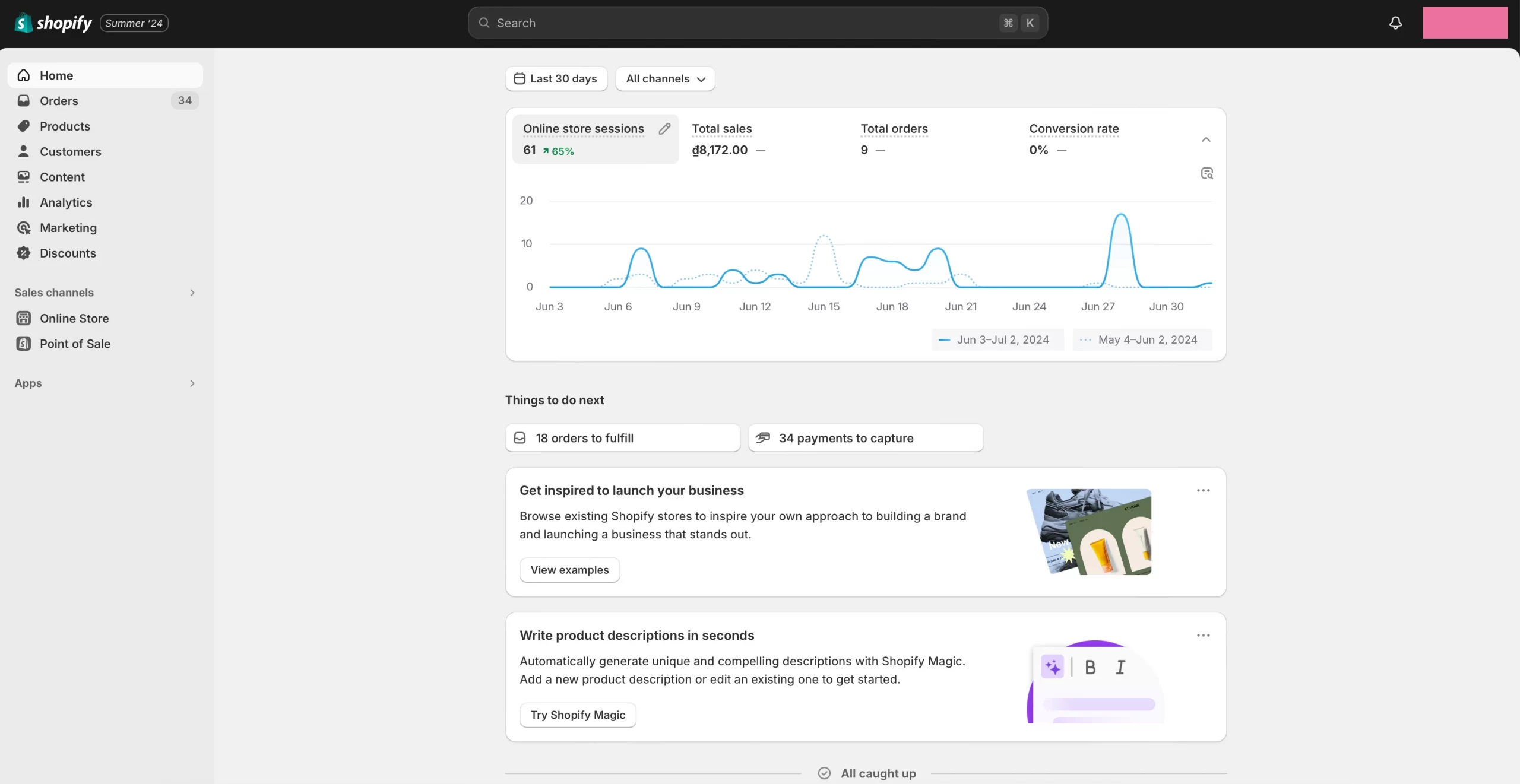
If you are unsure about the process, visit this Shopify tutorial to see how easy it is to create a Shopify store and give directions for configuring your eCommerce store.
Own-built website
If you create your own online store with a self-hosted solution, you will need a web developer to seek out hosting and domain services like Bluehost or GoDaddy.
The most important thing is that having a custom website means that you must have experience with coding and technical knowledge to build your store. Otherwise, passing the job to a skillful developer or a team is an optimal solution that can help you with the website setup.
Furthermore, to manage your own store, you should consider setting up a CMS for managing your blog and website. Plus, it is highly recommended that you may need to install a plugin with eCommerce functionalities to customize your e-store.
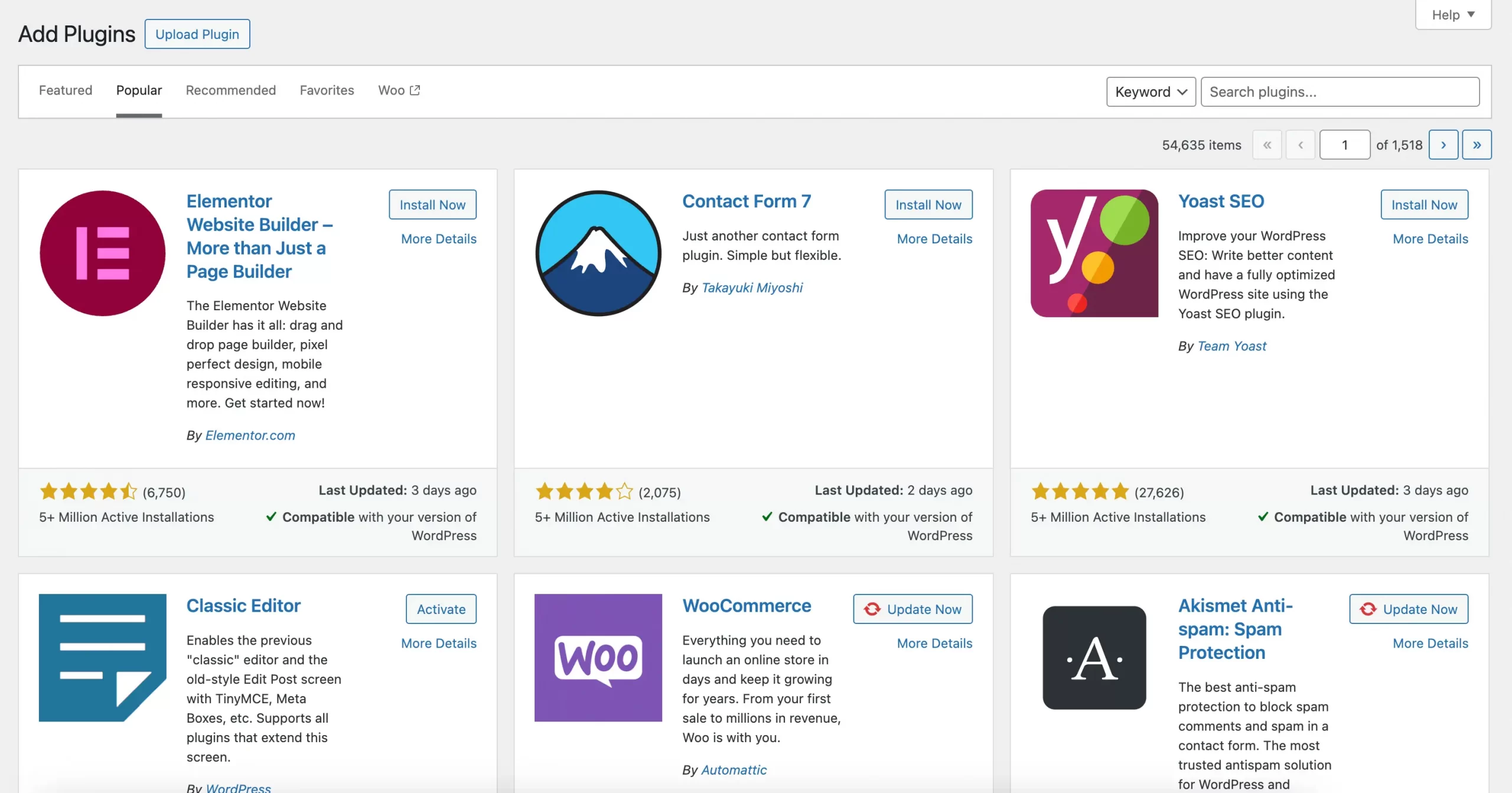
Let’s take WordPress as an example. The merchants usually use this platform to create their site and integrate with WooCommerce (a WordPress plugin) to get the full package of eCommerce features.
See more:
WordPress Vs Shopify For Ecommerce: Pros and Cons of Each Platform
Shopify Vs Shopify Plus Features: A Detailed Comparison
Design & Customization
It’s clear that a beautiful storefront will capture attention and implicitly boost sales. Fortunately, both Shopify vs own website can satisfy store owners – just in different ways.
Quick verdict:
While Shopify can help you save resources by providing easy-to-use, free, yet professional themes, custom-made websites enable more diversity and personalization in theme choices, although with more effort.
Shopify
Shopify currently offers over 200+ of the best Shopify themes, with prices for the paid themes and templates ranging between $140 and $450. After years of using Shopify, I have found that all Shopify themes are beautifully designed, responsive themes that satisfy any store owner’s requirements.

However, each theme also has specific adjustments. If you want to add some elements or develop a new feature that would improve the customer experience, Shopify Liquid is an effective way to modify your website’s underlying code. Hence, you can have various designs that can be edited flexibly to suit your demands.
If you're interested in themes that need little adjustment yet remain fully functional, I personally recommend some of the best Shopify themes for your preferences.
Your Own Website
On the other hand, for a custom-made website, you’ll spend more time and effort than usual to find the optimal theme or template to design. Let's say, using Shopify, I can quickly design the storefront within days, but with my own website, it can take weeks or even months with a lot of coding involved.
If you don’t have a web designer, there is still a huge theme marketplace where you can find plenty of responsive designs at affordable prices compared to the Shopify Theme Store. The awesome thing about having a personalized store design is that you will have unlimited space for customization. It is completely flexible, and you can have your own one-of-a-kind website.
But when researching custom-built options, I recommend that you make sure that they have a thousand positive reviews and active users. Along with flexibility in store design, the template needs to adapt to your audience’s values.
Want to Migrate Your Store and Grow on Shopify?
Having decided that the custom-built website is no longer the perfect fit? Switch to Shopify now and rocket your online business with powerful eCommerce functionalities, extensive apps, and improved loading speed with this platform.
Third-Party Integration
Quick verdict:
Shopify clearly wins this part as it offers credible integrations, saving you a lot of time and money. With custom-built websites, there might be risks and unknown costs.
Shopify
Store owners can install apps to further enhance and build a fully functional website via the Shopify App Store, which has more than 8,000 apps.
Shopify supports a huge number of third-party apps that assist with marketing, SEO, inventory tools, and heaps more. These apps help extend capabilities such as shipping, accounting, and so on. As a result, Shopify is an all-in-one package that can offer merchants a great number of eCommerce solutions.
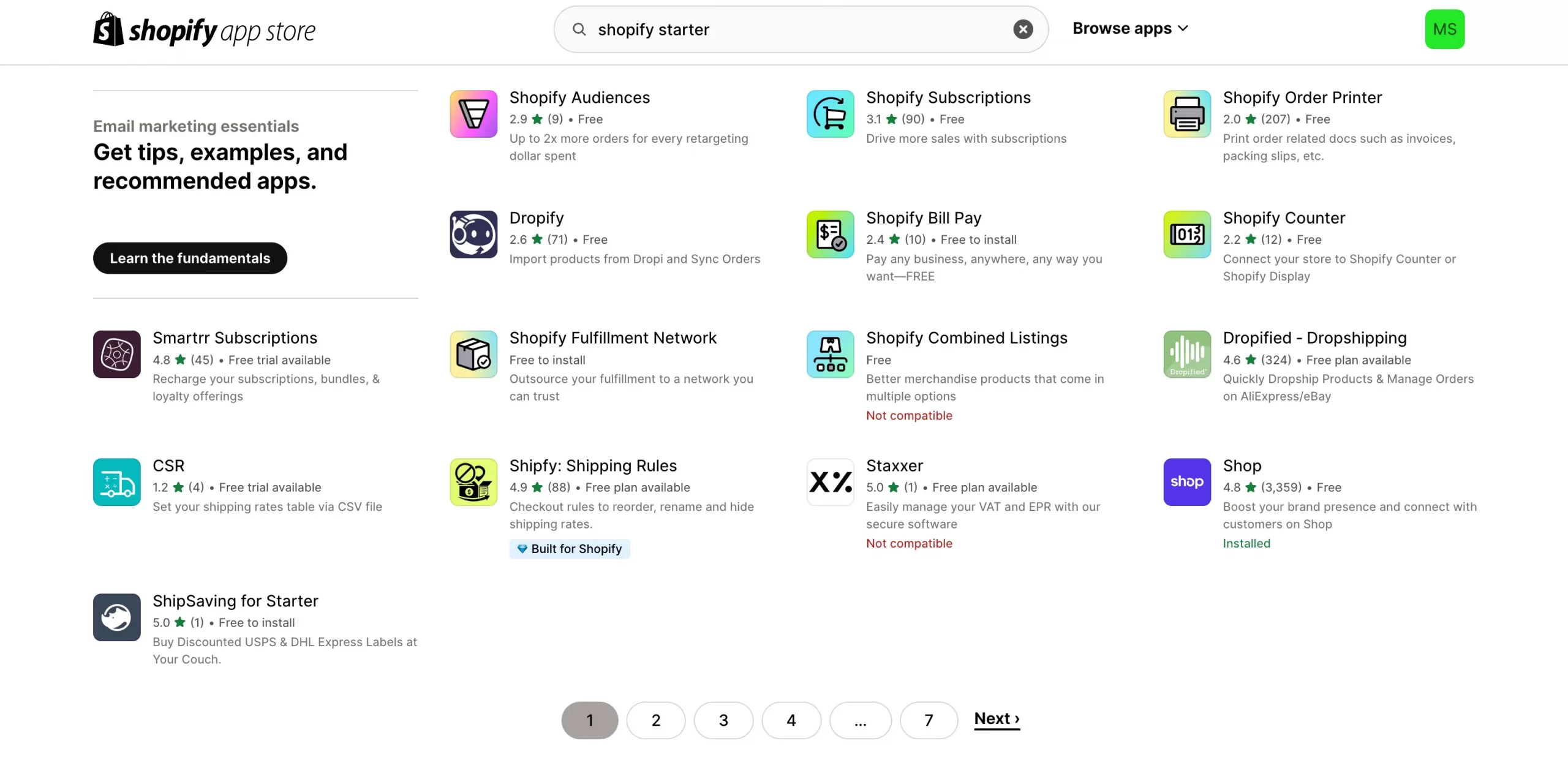
Whenever you can think of a feature, there’s probably a plugin for it to help you build the website for your preference. For instance, if you want to extend your reach, the platform supports sales channel integrations like Amazon or Facebook.
Own Websites
In contrast, building your own custom website presents a different set of challenges.
Depending on the open-source solution you choose, the process often involves extensive research and analysis to identify suitable plugins or extensions that align with your website's specific requirements. This can be time-consuming and may incur significant costs.
Furthermore, it's crucial to acknowledge that these plugins and extensions are often developed by various independent developers worldwide. This can lead to inconsistencies in quality and functionality. As a result, there's no guarantee that every plugin or extension you choose will seamlessly integrate or perform as expected.
So, my recommendation is that you should be cautious when adding these plugins/extensions to your website to avoid potential glitches and slow performance.
eCommerce Features
Quick verdict:
With Shopify, you'll have plenty of efficient eCommerce features given to you already. But for custom-made websites to work, you'll need to have coding skills or resources to hire a developer.
Shopify
Since Shopify is an all-inclusive eCommerce platform, it provides sellers with a plethora of eCommerce features. Here are some of the excellent ones:
- Fraud analysis: This can identify false orders and decrease chargebacks because Shopify can gather evidence for any disputed charges.
- Payment gateway providers: Merchants can choose Shopify Payment options such as Visa, Master Cards, etc., which are PCI compliant. Otherwise, using other payment providers is still allowed, but transaction fees must be paid.
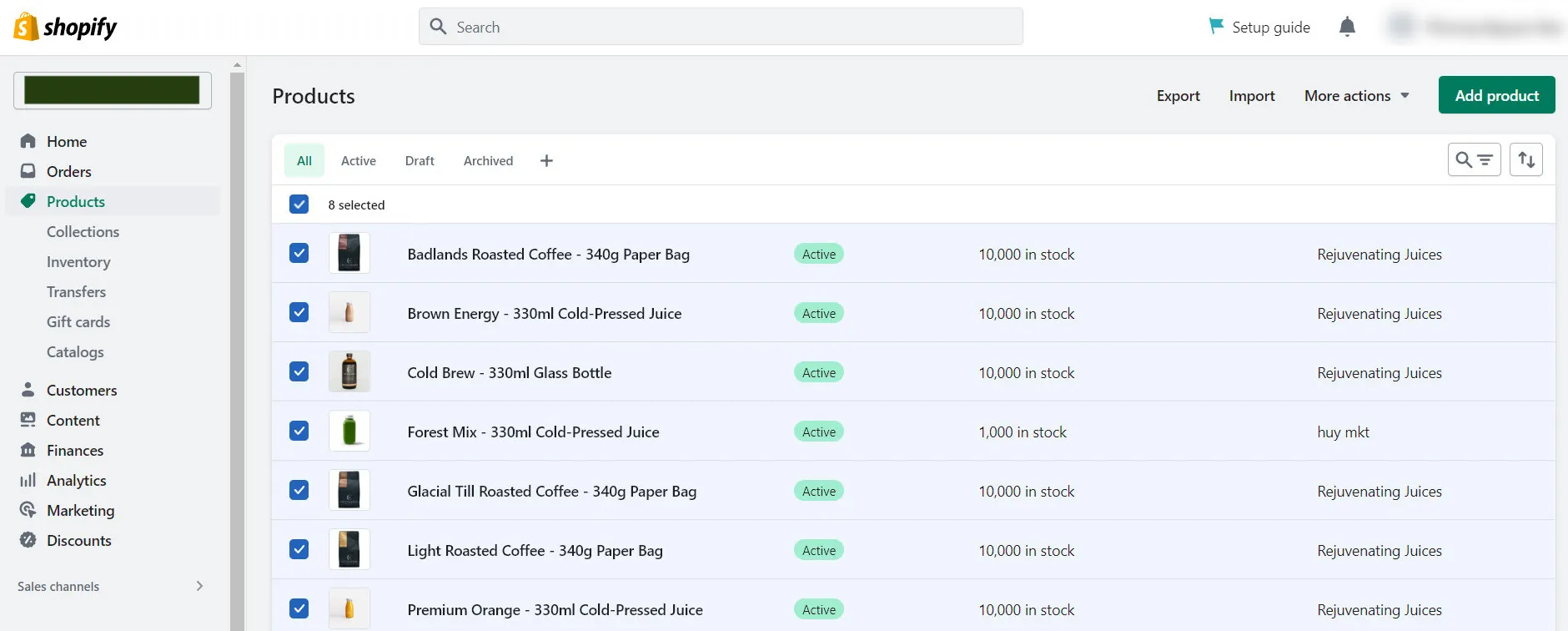
- Product management: Shopify lets you add products by clicking on “Products” right in the dashboard, where you can also manage your products. Plus, you can fill in related information about the products you sell. This information can include a title, a description, featured images, videos, and much more.
- Shipping: Shopify allows you to configure your shipping rates (e.g., free shipping, flat rate). With the Advanced Shopify plan, you can also unlock third-party calculated shipping rates. Therefore, customers can see the current courier prices at the checkout.
Own Website
Besides finding a proper platform and software to run your online business, you should choose reliable payment gateways and other high-quality extensions that best suit your eCommerce needs. However, having those eCommerce features means that the process requires coding to fully function your online store. Otherwise, hiring a developer and paying quite a lot of money is the final solution.
Further Reading:
- Is Shopify Or Etsy Better: Pros and Cons of Each Platform
- Selling On Amazon Vs Shopify: Comparing Features, Costs, and Flexibility
- Shopify vs eBay: Comparing Selling Platforms for Online Success
- Shopify vs Salesforce: Comparing Features, Scalability, and Costs
SEO Performance
Quick verdict:
If you have technical expertise or access to developers and want full control over your SEO strategy, a custom-built website offers greater flexibility and potential for better optimization.
Shopify
Shopify offers a range of built-in SEO tools, including customizable meta tags, automatic sitemap generation, and integration with Google Search Console.
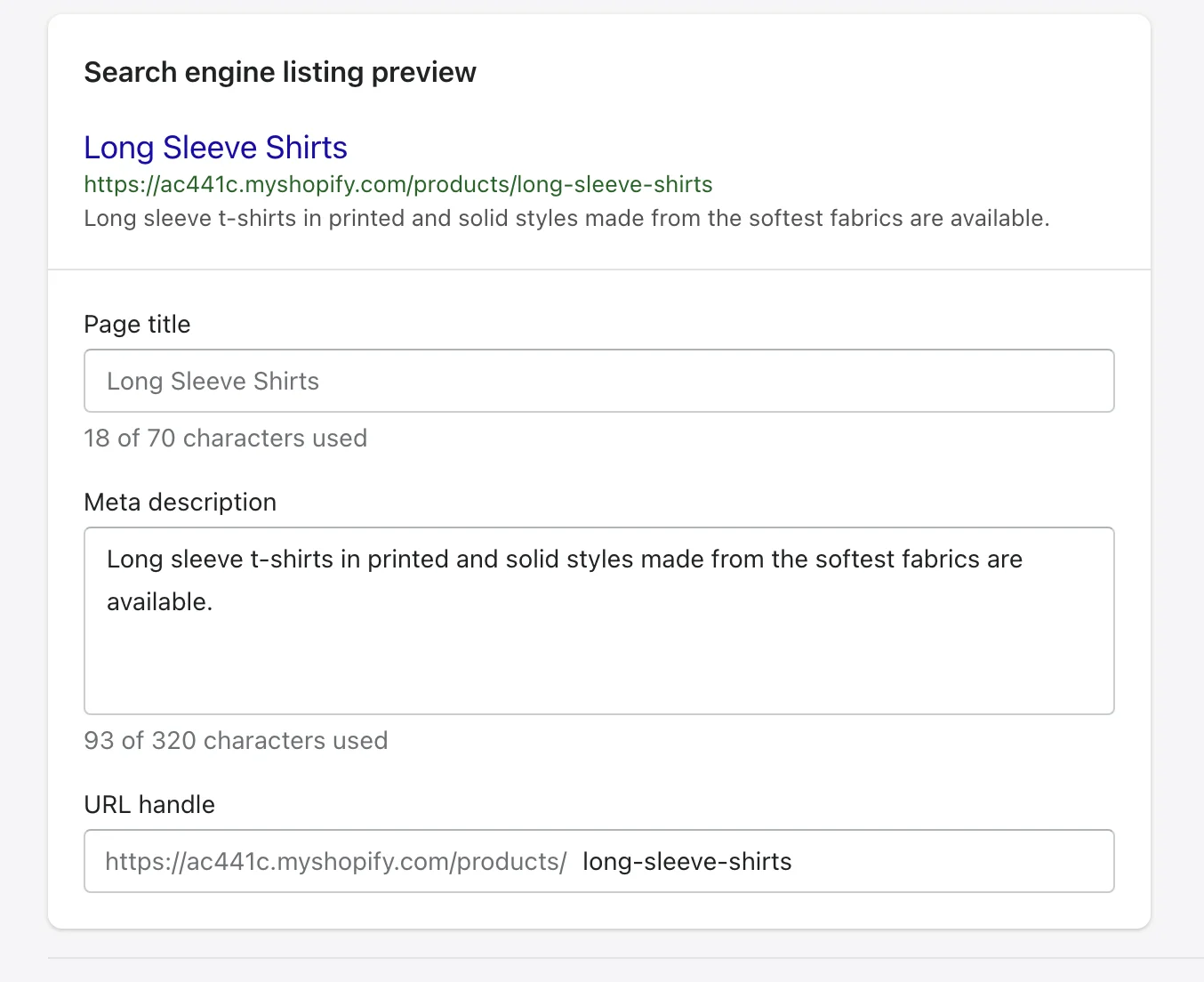
What's best about Shopify is that it is a hosted platform, meaning it handles server optimization and content delivery networks (CDNs). That means your website can ensure fast website loading times.
Besides, Shopify themes are generally mobile-responsive, which is crucial for SEO as Google prioritizes mobile-friendly websites.
However, when using Shopify, I have limited control over certain technical SEO aspects, such as URL structure, robots.txt file, and advanced server-side optimizations. Sometimes, the heavy use of third-party apps for SEO can lead to performance issues and conflicts.
Own Website
In contrast, I have complete control over all aspects of SEO, including URL structure, meta tags, sitemap creation, robots.txt file, and server-side optimizations with a custom-built website. I can implement advanced SEO strategies and tailor them to the specific needs and target audience.
Yet, it costs me a lot of time and effort since SEO optimization can be time-consuming and requires ongoing effort to stay up-to-date with the latest best practices. Sometimes, it can also be challenging to handle difficult technical issues, and seeking help from an SEO expert may incur additional costs.
Further Reading:
- Which is Better GoDaddy or Shopify: A Comprehensive Review for Online Stores
- Square Online Store Vs Shopify: A Comprehensive Guide for Sellers
- Shopify Vs Squarespace Ecommerce: Which Ecommerce Solution Suits You Best?
Security
Quick verdict:
Shopify has the advantage here as it offers free SSL certification and helps you with all data security set-ups. In contrast, using custom-built websites would require in-depth security knowledge, time, and financial resources.
Shopify
Apparently, there’s less to worry about when you choose a hosted platform like Shopify. You barely need to do anything—Shopify will take care of all security tasks in the background.
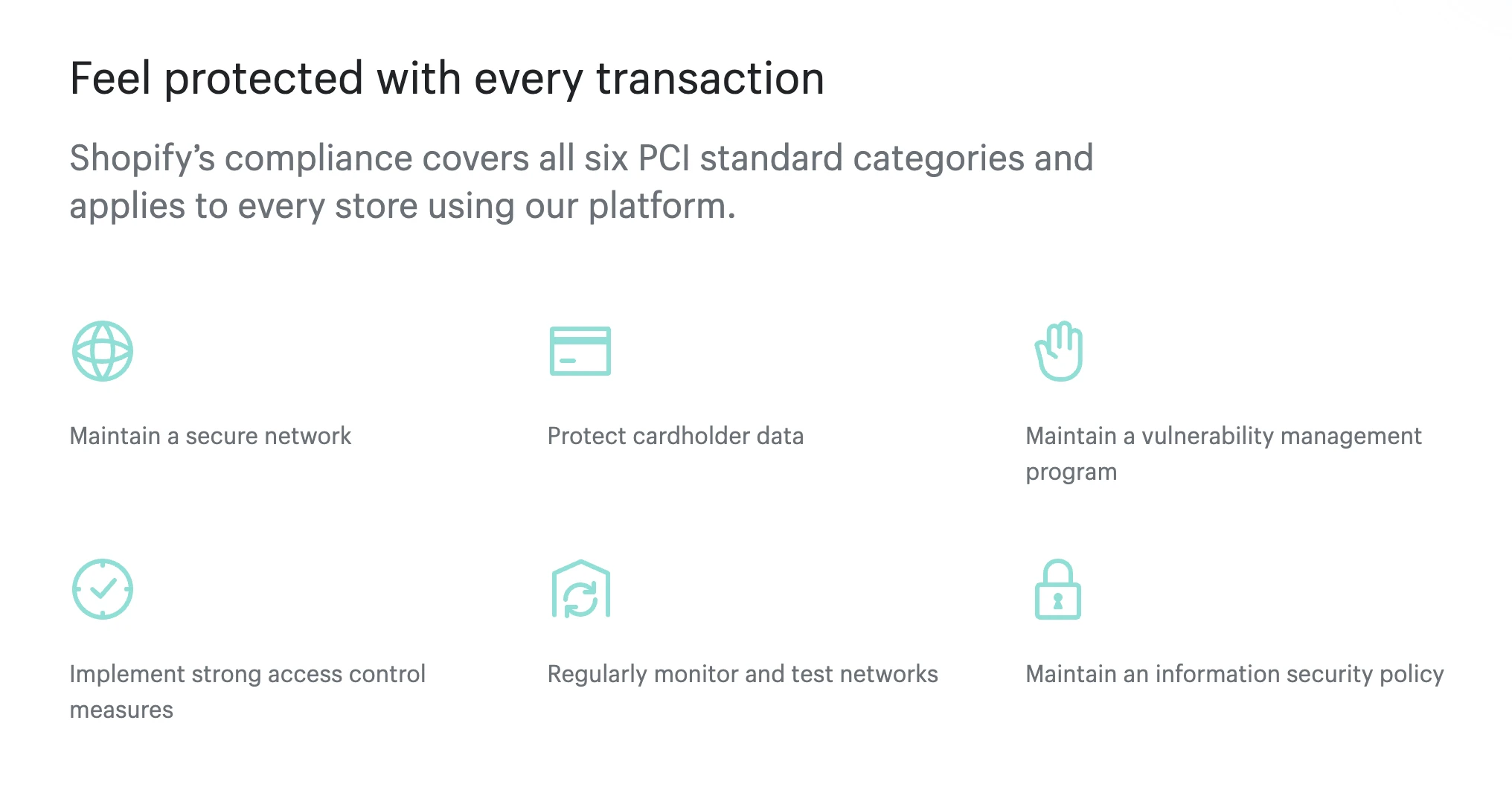
This platform offers free SSL registration for all online merchants as well as automatic updates. With SSL certificates, Shopify can help you to:
- Use HTTPs to add a new authentication layer to your store instead of HTTP.
- Place the SSL icon next to the URL of your online store to help gain customer interest.
Thankfully, all Shopify stores are certified Level 1 PCI DSS compliant (a.k.a. Payment Card Industry Data Security Standard). Every company that accepts card payments must comply with this data security standard. With Shopify, all your data and customer information are ultra-secure, making Shopify a legitimate platform.
Custom-built Websites
In contrast, when it comes to security, you will need to pay a certain amount of money to set up your security background. Plus, the process can be frustrating when unidentifiable problems arise.
Support
Quick verdict:
In the battle of Shopify vs own website, Shopify is outstanding in terms of support service compared to custom-built websites. This platform has all kinds of services that will definitely take care of you at any time.
Shopify
It is no exaggeration to say that Shopify’s support service is one of its strongest points compared to other platforms. All Shopify plans offer 24/7 support via email and live chat, which is always available to help. Furthermore, Basic Shopify also provides 24/7 phone support, but only in the English language.

Shopify also has a vibrant community where Shopify experts and users can share their experiences and knowledge with others.
At the same time, this community is where app providers and agencies can get insights into current merchants’ needs or trendy products. Accordingly, the Shopify community can open up a world of opportunities to connect meaningfully with merchants and partners.
Especially for text support, such as email or live chat, the Shopify support team can communicate via 19 languages for store owners worldwide.
Custom-built Websites
On the other hand, for the custom-made website, learning resources can be collected from Google, YouTube, forums, videos, blogs, etc. The range of resources is not limited, but you should spend more time researching what you want for your customers.
Let’s take WordPress WooCommerce as a typical example. If you use WooCommerce as a solution for your business, it supports tutorial documents only. Moreover, they don’t have any private support such as email or phone calls.
Bonus reading:
Our Recommendations to Help You Decide on Shopify or Own Website!
After analyzing the operational costs and features of both Shopify and custom-built websites, I have some recommendations for you.
♠ Choose Shopify if you:
- Prioritize ease of use and convenience
- Value speed and performance
- Seek built-in SEO features
- Prefer a hassle-free experience
♠ Choose a custom-built website if you:
- Have technical expertise or access to developers
- Want complete control over your SEO
- Have a larger budget and long-term vision
- Have unique features and integrations
- Prioritize maximum flexibility and scalability
I understand that there are other factors to consider, such as your target audience and industry or your content strategy. For instance, if you primarily make sales in person through a POS system, I believe Shopify would be the better choice. On the other hand, if blogging or SEO is your main focus, I would recommend a custom-built website for your needs.
Make Your Migration Project A Breeze with LitExtension
Don’t have time to manually perform the migration? Let LitExtension lift the burden off your shoulders with our top-of-the-class migration service. Enjoy a streamlined and secure data transfer process without having to lift a finger!
Shopify vs Own Website – FAQs
It depends on your needs and expertise. Shopify is better for beginners and those seeking a quick, easy, and hassle-free solution. A custom-built website is better for those with technical skills or resources who desire full control and customization.
Shopify has limitations, such as restricted customization, potential for higher long-term costs, and reliance on third-party apps for certain functionalities.
Yes, you can use Shopify's “Buy Button” feature to embed products or a shopping cart into an existing website built on another platform.
Yes, Shopify is worth it for many businesses. Especially for beginners and small to medium-sized enterprises, the benefits of Shopify outweigh its drawbacks. It offers a convenient, user-friendly platform with a wide range of features and support.
Final Words
Hopefully, this head-to-head comparison between Shopify vs own website can answer your burning question, “Which one should I invest in?”. There is no right or wrong – it all depends on your demands and requirements for your business. That's not to mention there's an AI website builder that has just been slowly coming up in recent years.
In case you want to migrate your current website to Shopify, LitExtension – #1 Shopping Cart Migration Expert is eager to help you! As the world-leading shopping cart migration, we can assure you that we will transfer all your current data speedily, securely, and accurately with our automated migration tool. If you need further information about data migration, please don't hesitate to contact LitExtension customer support.
Let's visit our eCommerce community and eCommerce platform section for further insights about Shopify and other solution.

